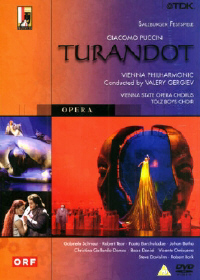

 |
 |
|
 PUCCINI
Turandot (completed by Berio) at Salzburg PUCCINI
Turandot (completed by Berio) at Salzburg
Gabriele Schnaut (Turandot), Johan Botha (Calaf), Christina Gaillardo-Domas (Liù), Paata Burchuladze (Timur), Robert Tear (Altoum), Vienna Philharmonic, Mozarteum Orchestra, Vienna State Opera Chorus, Tölz Boys Choir, Valery Gergiev (conductor), David Pountney (director), Marie-Jeanne Lecca (costumes), Johan Engels (sets), Brian Large (video director) Salzburg
Grosse Festspielhaus, August 2002
PUCCINI Turandot (completed by Alfano) at Beijing Turandot
at the Forbidden City of Beijing RCA 74321
60917 2 [16:9] The Salzburg version has at least two claims upon attention. From the musical point of view, it is a first UK opportunity to see in context the late, lamented Luciano Berio's 2001 version of the ending, which looks set to supercede Alfano's. And the production, another spectacular from the Salzburg Festival, filmed at the Grosses Festpielhaus (the one carved out of a cliff, which I remember, when Furtwangler conducted Zauberflote, as the Rocky Riding School, I think it was then called). David Pountney's concept, based upon a world gone mad with soulless robot-like administration and elimination of human values, definitely profits from the grandiose possibilities and budget at Salzburg. The video pictures are breath-taking and never can the Three Riddles scene have made a more powerful effect, though I am not entirely sure that Gabriela Schnaut's singing eclipses memories of the great Eva Turner, with whose Turandot we grew up. But she and her Calaf, Johan Botha, are larger than life characters, in every respect, and dispense generous tone, if not always greatest subtlety of musical line. There are captivating special effects, not least the immense height of Turandot's gown until she comes down to earth and love at the end. David Pountney is as inventive as ever, relishing the huge canvas he is offered at Salzburg. The sound is good and this is certainly one for the collection, though for an equally original Turandot we look back with affection to Christopher Alden's uncompromising, and relatively economical, updated Welsh National Opera production as particularly thought provoking and memorable. The Mehta/Yimou
Beijing outdoor production, developed from the Florence Maggio
Musicale, with the Beijing Dance Academy participating, takes you
to timeless ancient Peking, filmed outdoors in one of the palaces.
With traditional flags, armour and uniforms, statues of dragons
and other legendary monsters, gorgeous costumes and spectacular
processions, it is a really exotic eyeful. By the end, these excesses
begin to pall, and the conventional Alfano completion felt perfunctory.
I thought Giovanna Casella not nearly formidable enough as
the Ice Princess, nor was she well directed to maximise the impact
of her crucial scenes, but Sergei Larin looked and sounded
well as Calaf and his characterisation was altogether more convincing.
Barbara Frittoli is duly affecting as Liu, though she seems
to take an unconscionable time singing her heart out before killing
herself. Timur's make up could not stand close up viewing. The setting
in the Forbidden Palace is truly breathtaking, as are the views
of historic China. The orchestra is rather backwardly recorded,
but for Turandot collectors this too is one not to miss. The booklet
is informative and better than those for so many opera DVDs. |